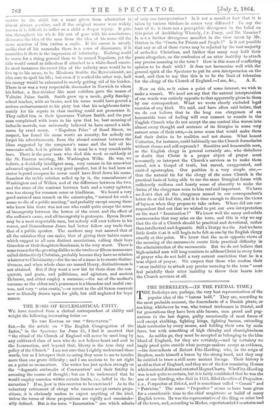THE BASIS OF ECCLESIASTICAL UNITY.
WE have received from a clerical correspondent of ability and weight the following interesting letter :-
To THE EDITOR OF THE "SPECTATOR."
Sin,—In the article on "The English Congregation of the Index," in the Spectator for June 25, I find it asserted that "the ritual of the Church of England will never be used long by any cultivated class of men who do not believe heart and soul in the Incarnation, and beyond that, liberty is the true duty and policy of the Church." Jam not sure that I rightly understand these words, but as I interpret their meaning they seem to me to involve more than one grave difficulty ; and I am anxious to be set right on a point so momentous. The writer has just spoken strongly on the "dogmatic outbreaks of Convocation" and their futility in arresting the course of thought ; but am I to understand that he would employ coercion within certain limits, i.e., belief in the In- carnation ? If so, !tow is this coercion to be exercised? As to the voluntary retirement of clergy who cannot accept certain propo- sitions, it is obviously useless to expect anything of the kind, unless the terms of those propositions are rigidly and unmistake- ably defined. But is the term "Incarnation" one which admits of only one interpretation ? Is it not a manifest fact that it is taken by various thinkers in senses very different ? To say the least of it, is there not a perceptible divergence in the belief on this point of Archbishop Whately, Dr. Pusey, and Mr. Maurice? Is not a further divergence manifest in the view taken by Mr. Hutton in the "Tracts for Priests and People ?" Is it not possible that any or all of these views may be rejected by the vast majority of orthodox Christians, and further that many may hold their peace altogether, on the confession of an utter inability to attach any precise meaning to the term ? How is this mass of conflicting opinion to be dealt with? It does not harmonize well with the general spirit of the Spectator to put its own interpretation on the word, and then to say that this is to be the limit of toleration
for the clergy of the Church of England.—I am, &c., A. Z.
Now on this, as it raises a point of some interest, we wish to make a remark. We need not say that the natural interpretation of our words was entirely opposite to that apparently given to them by our correspondent. What we wrote clearly excluded legal coercion of any kind. We said, and have often said before, that we do not believe that in the long run clergymen of an honourable tone of feeling will ever consent to remain in the English Church who do not accept the one central idea woven into almost every thought and sentence of its liturgies in some very earnest sense of their own,—in some sense that would make them feel their duties to be realities and not shams. What honest Unitarian, for instance, could habitually use the Church formularies without shame and self-reproach ? Sensitive and honourable men, as the English clergy in general certainly are, who disbelieve or doubt that Christ is a proper object of prayer must necessarily so interpret the Church's services as to make them sound, not a Gospel of truth, but unreal, exaggerated, and excited apostrophes. Our position is a very simple one,— that the natural tie for the clergy of the same Church is the practical basis of being able to use the same liturgical forms with sufficiently uniform and hearty sense of sincerity to make the duties of the clergyman seem to him real and important. We have no doubt that all the clergymen named in our correspondent's letter do or did feel this, and it is time enough to discuss the views of-laymen when they propose to take orders. Where did our cor- respondent find out that we wished to put our own interpretation on the word " Incarnation ?" We know well the many and subtle controversies that may arise on the term, and this is why we say that the tie of a Church should be practical and devotional, rather than intellectual and dogmatic. Still a liturgy is a tie. And we have little doubt that it will begin to be felt as one by the English clergy exactly at this point. We know that the most opposite views of the meaning of the sacraments create little practical difficulty in the administration of the sacraments. But we do not believe that high-minded men will long continue to address Christ in every form. of prayer who do not hold a very earnest conviction that he is a true object of prayer. We suspect that those who confess their "utter inability to attach any precise meaning to the term" must feel painfully their utter inability to throw their hearts into, the Church services at all.






























 Previous page
Previous page